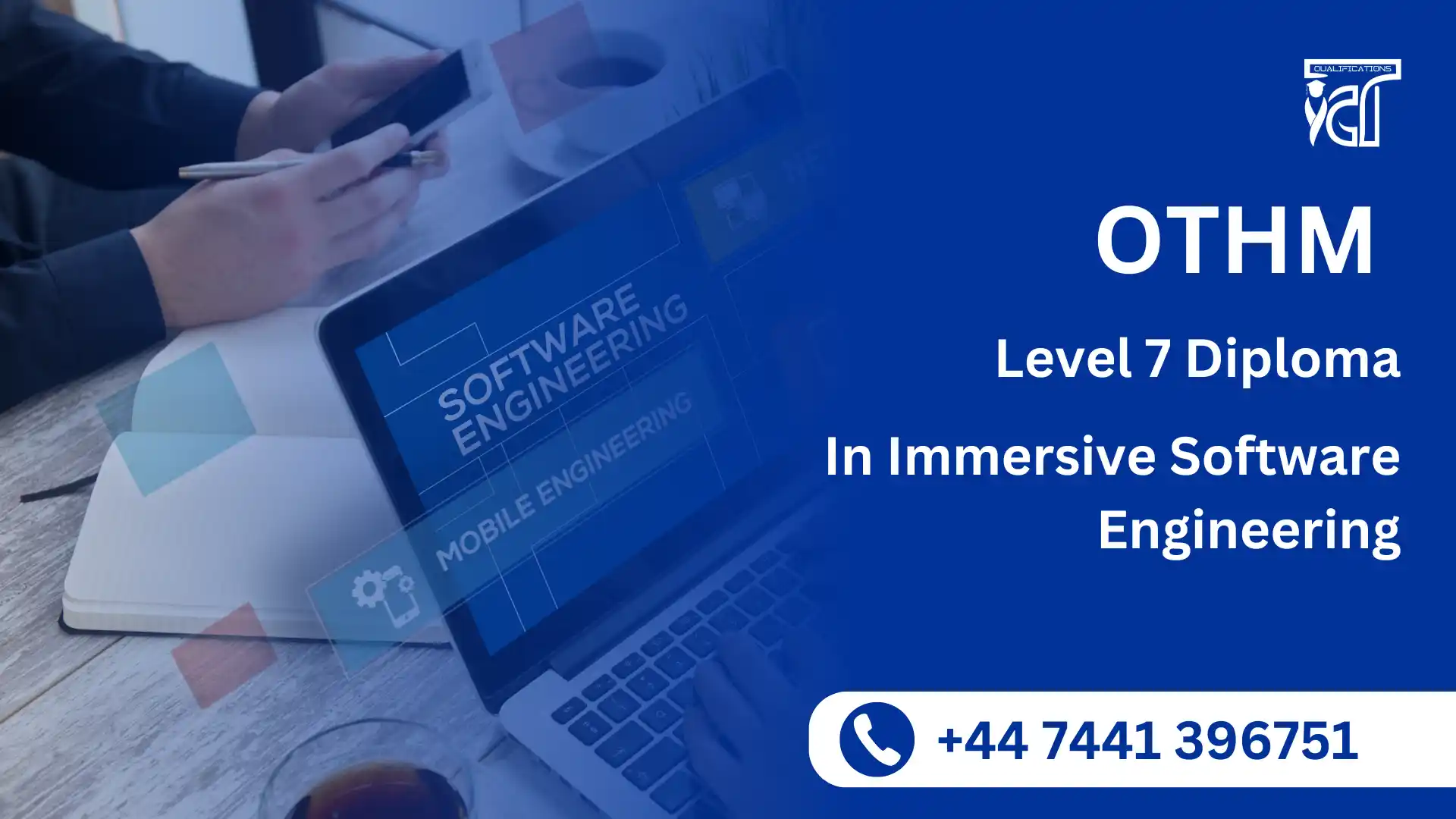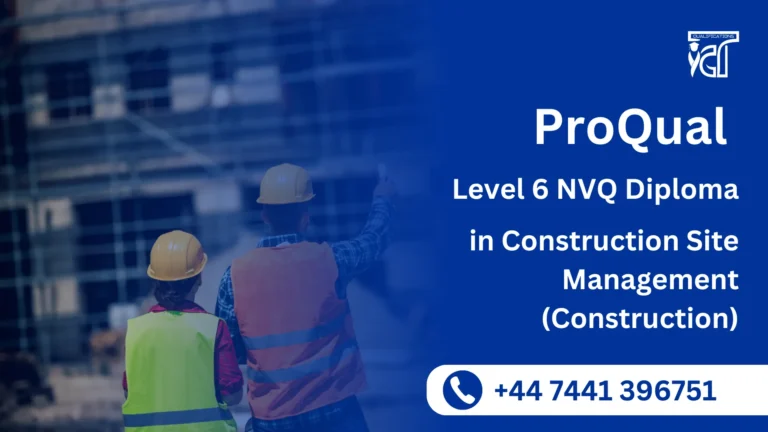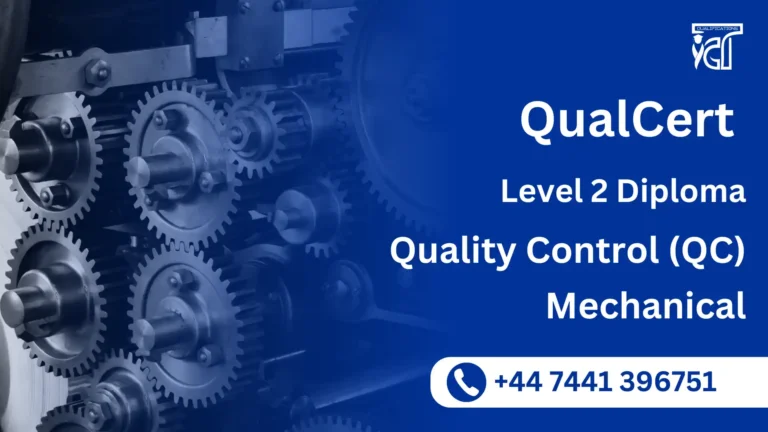In today’s rapidly evolving digital landscape, immersive technologies such as virtual reality (VR), augmented reality (AR), and mixed reality (MR) are transforming industries across the globe. For professionals eager to thrive in this exciting and innovative field, the OTHM Level 7 Diploma in Immersive Software Engineering offers a comprehensive and industry-recognized qualification.
This Ofqual-regulated qualification is designed for individuals looking to deepen their expertise in immersive software engineering, providing them with the essential skills needed to develop cutting-edge software for immersive environments. Whether you’re aiming to step into the world of immersive technologies or looking to further your career in this dynamic sector, this qualification equips you with the tools and knowledge to succeed.
The OTHM Level 7 Diploma in Immersive Software Engineering is the ideal qualification for professionals looking to advance their careers in the rapidly growing field of immersive technologies. With its Ofqual-regulated status, flexible learning model, and industry-relevant content, this diploma provides an excellent pathway for those eager to gain specialized expertise in VR, AR, and MR development.
OTHM Level 7 Diploma in Immersive Software Engineering
The OTHM Level 7 Diploma in Immersive Software Engineering comprises 6 mandatory units, totaling 120 credits. The qualification includes 1200 hours of Total Qualification Time (TQT) and 600 Guided Learning Hours (GLH) upon completion.
| Sr# | Unit Title | Credits | GLH |
|---|---|---|---|
| 1 | Security Engineering | 20 | 100 |
| 2 | Software programming principles and practices in Java I | 20 | 100 |
| 3 | Agile Project Management | 20 | 100 |
| 4 | Cloud Computing & DevOps | 20 | 100 |
| 5 | Database & SQL Programming | 20 | 100 |
| 6 | Web Designing | 20 | 100 |
GLH (Guided Learning Hours) and TQT (Total Qualification Time) are terms commonly used in vocational qualifications to help define the amount of time a learner is expected to spend on heir studies.
1. GLH (Guided Learning Hours)
GLH refers to the number of hours a learner spends being directly taught, supervised, or supported during their course. This includes the time spent in activities such as:
- Classroom instruction
- Practical workshops
- One-on-one tutoring or mentoring sessions
- Online learning sessions with tutor support
In other words, GLH represents the time that learners are actively engaged with their instructors or learning activities.
2. TQT (Total Qualification Time)
TQT represents the total amount of time a learner is expected to invest in completing a qualification, including:
- GLH (Guided Learning Hours): Time spent on direct learning, as explained above.
- Self-Directed Learning: This includes time spent on independent study, research, assignment completion, preparation for exams, and any other work the learner does outside of direct teaching hours.
TQT is a broader measure that includes all the time required to achieve the qualification. It helps learners and employers understand the overall commitment required for the qualification.
Key Differences Between GLH and TQT:
- GLH focuses on direct learning with guidance or supervision.
- TQT includes GLH as well as independent study time and other learning-related activities.
Example:
If a qualification has a TQT of 600 hours and a GLH of 250 hours, it means the learner should spend 250 hours in direct learning (classroom, online, or tutor-led sessions) and 350 hours on independent study or research.
Learning Outcomes of OTHM Level 7 Diploma in Immersive Software Engineering
Security Engineering
- Be able to analyse and evaluate the security of systems and web applications architecture.
- Be able to implement system hardening techniques.
- Be able to apply encryption techniques to secure data.
- Be able to understand and implement data security measures including identifying and mitigating social engineering attacks.
- . Be able to use tools and standards for security engineering.
Software Programming Principles and Practices in Java I
- Understand the importance of programming in the current world
- Understand why java is called a portable language
- Understand how data is stored and processed
- Understand about arithmetic and Boolean operators
- Be able to understand multiple conditional statements and breaking out of them
- Understand the usage and importance of loops and functions
- Introduction to multiple data storage types
- Introduction to classes and objects
Agile Project Management
- Be able to understand the fundamentals of project management and the role of project manager
- Be able to understand traditional project management with Waterfall SDLC (software development life cycle)
- Be able to understand & apply business agility in the context dynamic market changes
- Be able to understand & apply scrum framework to build IT products
- Be able to attain knowledge required to perform roles like scrum master, product owner & developers
- Be able to understand & leverage kanban to optimize the flow of value
- Be able to understand & leverage product mindset to build customer centric products
- Be able to understand & demonstrate knowledge of agile planning & estimation
- Be able to understand & demonstrate team dynamics within an agile team
- Be able to understand & demonstrate scaling agile to build complex products with large teams
Cloud Computing & DevOps
- Be able to understand and implement continuous integration and continuous delivery process and techniques
- Be able to understand, design and implement distributed systems on cloud.
- Be able to understand docker container and implement container orchestration using Kubernetes
- Be able to use tools and standards for Linux system fundamentals, command line interface, user/group management.
Database & SQL Programming
- Understand data and its storage importance, traditional storage systems and its challenges, understand importance of modern relational database and management systems (RDBMS)
- Understand the relational database installation and configuration, role of client and DBMS server. Understand basics of SQL programming language to communicate with relational database and management systems (RDBMS), understand relational table structures and SQL Data Definition Language (DDL)
- Understand various data manipulation techniques, queries to manipulate data – SQL data manipulation language (DML), understand database transactions and use of SQL Transaction Control Language (TCL)
- Understand data retrieval techniques, data transformations, SQL commands to query database (DQL), understand data summarisation and its support in SQL program
- Understand how to query metadata, understand significance of data quality and data auditing, RDBMS techniques to enforce data quality and data auditing.
- Understand the importance of data access control, security of sensitive data and SQL commands to enforce data access control and security
Web Designing
- Understand what the building blocks of a web page and basics needed to design it
- Understand the basics of CSS and different styles and how to integrate CSS with Html
- Understand CSS rules and their order
- Understand and implement tables and lists in HTML with examples using CSS
- Understand user input properties of HTML
- Introduction to DOM
- Introduction to Javascript and its uses
- Demonstrate basic JS properties and functions.
The Benefits of OTHM Level 7 Diploma in Immersive Software Engineering are as :
- Industry-Relevant Skills: The course equips learners with advanced skills in immersive technologies, software development, and engineering practices that are highly sought after in today’s tech industry.
- Master’s-Level Equivalent: Recognized at the same level as a master’s degree on the Regulated Qualifications Framework (RQF), providing learners with a prestigious qualification that is globally acknowledged.
- Comprehensive Learning Experience: The 120-credit structure, with 1200 hours of Total Qualification Time (TQT) and 600 Guided Learning Hours (GLH), ensures in-depth learning and hands-on experience in cutting-edge software engineering practices.
- Career Advancement Opportunities: Graduates will be well-prepared for senior roles in software engineering, immersive technology development, and related fields, offering great potential for career growth.
- Foundation for Further Studies: The diploma serves as a solid foundation for learners who wish to pursue a full master’s program, with the option to progress to the dissertation stage at a university.
- Practical Application: With a focus on immersive software engineering, students gain practical, real-world skills that can be applied immediately in professional environments, making them highly employable.
- Expert-Led Learning: Learners are guided by experienced instructors with industry expertise, providing insights into the latest trends and technologies in immersive software development.
- Flexible Learning Path: The course is designed to cater to both full-time students and professionals looking to enhance their qualifications while working, offering a flexible approach to learning.
The ideal learner for this OTHM Level 7 Diploma in Immersive Software Engineering is someone who:
- Strong Technical Background
- Familiarity with software development, programming, and computer science principles.
- Interest in Emerging Technologies
- Passion for working with immersive technologies like virtual reality (VR) and augmented reality (AR).
- Career Advancement Focused
- Aiming for senior roles in software engineering or looking to specialize in immersive technology.
- Desire for a Higher-Level Qualification
- Seeking a master’s-level qualification but in a more focused, accelerated format.
- Self-Motivated and Independent
- Able to manage time effectively and work independently on assignments and projects.
- Hands-On, Practical Learner
- Interested in applying theory to real-world software engineering challenges.
- Looking to Pursue Further Studies
- Motivated to progress to a full master’s program or continue in advanced academic or professional fields.
- Innovative and Future-Focused
- Eager to contribute to innovation and advancements in immersive software engineering.
Entry Requirements
Register Now
Qualification Process
Qualification Process for the OTHM Level 7 Diploma in Immersive Software Engineering
- Self-Assessment:
Begin by evaluating your eligibility to ensure you meet the qualification requirements, including work experience, knowledge, and language proficiency. - Registration:
Complete your registration by submitting the required documents, including a scanned copy of a valid ID, and paying the registration fee. - Induction:
An assessor will conduct an induction to confirm your eligibility for the course and explain the evidence requirements. If you do not meet the criteria, your registration will be canceled, and the fee will be refunded. - Assignments & Evidence Submission:
Provide all assignments and the necessary evidence based on the assessment criteria outlined in the course. If you are unsure of the required evidence, consult with the assessor for guidance on the type and nature of evidence needed. - Feedback and Revision:
The assessor will review your submitted evidence and provide feedback. Evidence that meets the criteria will be marked as “Criteria Met,” while any gaps will be identified. You will be asked to revise and resubmit if needed. - Competence Evidence:
Submit final evidence demonstrating that all learning outcomes have been met. This evidence will be marked as “Criteria Met” by the assessor once it is satisfactory. - Internal Quality Assurance (IQA):
The Internal Quality Assurance Verifier (IQA) will review your evidence to ensure consistency, quality, and compliance with standards. - External Verification:
The IQA will submit your portfolio to OTHM External Quality Assurance Versifier (EQA) for final confirmation. The EQA may contact you directly to verify the authenticity of your evidence. - Certification:
Upon successful completion of all checks, OTHM will issue your official certificate, confirming that you have attained the OTHM Level 7 Diploma in Immersive Software Engineering







